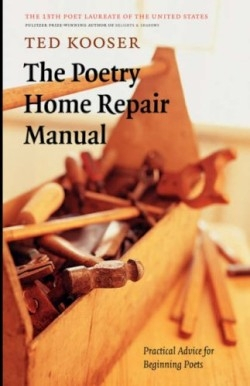The Poetry Home Repair Manual
Practical Advice for Beginning Poets
The Poet Laureate of the United States didn’t need to write a poetry handbook. There are dozens of books that, to varying degrees of success, teach developing poets how to nurse their early craft into the real art. Some are well organized, offering fine models and solid means of practice. However, many are inconsistent in these essential areas of study. Kooser’s book is outstanding because in every important characteristic of a handbook, it succeeds.
Written by a practicing poet who has published ten books of poetry over forty years and who is currently serving as the U.S. Poet Laureate, this handbook is one of the best. It is organized and helpful in both practical and fundamental ways, and offers excellent models for exercises. Most important, this book is friendly. Kooser’s voice is that of a wise and comfortable mentor who assumes that the reader has been working with him for a long time, and has stopped into his workshop to solve a small but thorny problem of language. He will help.
The first chapter discusses something that few poetry handbooks do: the purpose of poetry. Kooser’s take on this sometimes controversial subject is simple and clear. People make poems to be of service. Poetry is more important than the poet; to carry out that altruistic premise, poets need to practice. From this gentle but direct beginning, chapters continue, addressing respecting audiences, the arc of a poem, when to follow rules and when to break them, shaping formal poetry, writing about feelings, and working with detail.
His most formidable chapter, the last, is also hardest for developing poets to practice because it is so simple. In this chapter, he suggests the process of “cooling off” new poems, waiting for them to lose their first luster and passionate impulse so that the poet “forgets” the poem and can return later with a clear head. In this chapter, he also offers astute advice about writing groups, which can be both the boon and bane of maturing poets. He discusses what to look for in a group: encouragement, constructive criticism (he offers examples), basing responses on observations (not evaluation), and having fun.
This advice, like the book overall, is solid and practical and will help the developing poet think deeply about the craft of poetry. This is the rare handbook that will support developing poets and energize poets already practicing the craft, and is a must-have for instructors of poetry. Though Kooser didn’t need to write it, new poets will be grateful that this master chose to share his wisdom.
Reviewed by
Anne-Marie Oomen
Disclosure: This article is not an endorsement, but a review. The publisher of this book provided free copies of the book to have their book reviewed by a professional reviewer. No fee was paid by the publisher for this review. Foreword Reviews only recommends books that we love. Foreword Magazine, Inc. is disclosing this in accordance with the Federal Trade Commission’s 16 CFR, Part 255.

